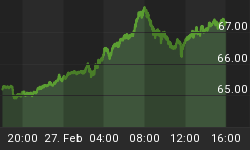Below are two identical charts contrasting the US dollar index and the large cap/small cap ratio as expressed by the SPX:RUT. For purposes of expression, the first chart has been stripped of the actual monthly data - leaving behind each respective 50 month SMAs.
You will notice that over the past two decades both series have trended together, with typically a lag between what I refer to as the primary and secondary tide. In essence, just as an oceans tidal effects are delayed by the inlets of a bay, the pressure differentials in correlations between markets - express a lag as well. The primary tide was determined by the first long-term moving average to pivot from trend.
- In the early 1990's (09/92') the dollar was the first to pivot higher - foreshadowing the American economic dominance (Irrational Exuberance) that was to follow for the balance of the decade.
- In April of 1999, the ratio's moving average turned down following the 1998' sovereign debt crisis - foreshadowing the much broader economic dislocation that was realized a year later.
- Today, the dollar's long-term moving average appears to be once again trending higher as the primary tide. Similar to 1998, this pivot was made last year when the effects of the European sovereign debt crisis - hit the broader indices in the back half of the year.
It is my suspicion that over the next several months, the effects of a stronger dollar - in the face of historic interventions by our monetary handlers, will once again initially have a disruptive influence on the broader markets; with higher beta stocks - such as the Russell 2000, leading the broader market lower.
This market perspective dovetails cleanly into my note from last week (see Here), describing the conforming pattern of the long-term moving average of the silver:gold ratio - that is now resting on its 20 year trend-line.
As always - Stay Frosty.


















